Posts
Editorial Humor for Hump Day, Only This is No Joke
/0 Comments/in Books & Writing, Media, Blogging, Internet /by Philip Turner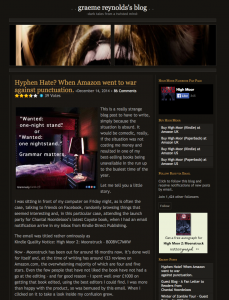 A fussy and censorious reader objected to the use of hyphenated words in High Moor II: Moonstruck, a novel for sale on Amazon written by UK author Graeme Reynolds. Amazon, which likes to trumpet how customer-focused they are, jumped at the complaint and ran a spell check on the book. Finding more than 100 hyphenated words in the 90,000 word ms, which they apparently found excessive, they instructed Reynolds to re-edit the Kindle edition of the book, lest it be removed from sale. Not surprisingly, Reynolds was gobsmacked at the absurdity of the situation. He blogged about it in a post titled Hyphen Hate: When Amazon Went to War Against Punctuation (screenshot at left). The book was indeed removed from sale, and the post drew more than 300,000 readers to his site. Amazon evidently thought better of their decision—or didn’t want more negative publicity—and they reinstated Reynolds’ novel. Via this link you can listen to an interview with the author on CBC’s As it Happens, and ponder Amazon’s ridiculous policies.
A fussy and censorious reader objected to the use of hyphenated words in High Moor II: Moonstruck, a novel for sale on Amazon written by UK author Graeme Reynolds. Amazon, which likes to trumpet how customer-focused they are, jumped at the complaint and ran a spell check on the book. Finding more than 100 hyphenated words in the 90,000 word ms, which they apparently found excessive, they instructed Reynolds to re-edit the Kindle edition of the book, lest it be removed from sale. Not surprisingly, Reynolds was gobsmacked at the absurdity of the situation. He blogged about it in a post titled Hyphen Hate: When Amazon Went to War Against Punctuation (screenshot at left). The book was indeed removed from sale, and the post drew more than 300,000 readers to his site. Amazon evidently thought better of their decision—or didn’t want more negative publicity—and they reinstated Reynolds’ novel. Via this link you can listen to an interview with the author on CBC’s As it Happens, and ponder Amazon’s ridiculous policies.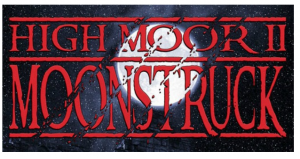
Beginning of the End of Favoritism for Online Sellers?
/0 Comments/in Books & Writing, Publishing & Bookselling /by Philip TurnerI’ve never observed a consensus on anything between Amazon and the American Booksellers Association, but a new initiative from a bipartisan group of 10 U.S. senators seems to have found that improbable sweet spot, at least for now. Called the Marketplace Fairness Act, according to Publishers Weekly, a new law would have the “goal of […]
Amazon Plays a New Card in its Face-off with Hachette
/0 Comments/in Books & Writing, Publishing & Bookselling, Technology, Science & Computers /by Philip TurnerA day after Amazon released its anonymous statement below, helpful analyses of it are appearing, including this one on PublishersMarketplace.com (subscription req.) and these annotations by Mike Shatzkin.
—–
A new gambit from Amazon announced on their Kindle forum at about 1:30 PM (PDT) today strikes at the weakest part of the Big 5’s stance, with those companies still stuck on their overly parsimonious 25% royalty on ebooks, five + years into the digital transition. It’s a longtime bone of contention with authors and agents, and organizations like the Authors Guild, a position with which I agree. In their post Amazon says what they think the digital ecosystem ought to look like, and what most ebooks ought to cost: They say divide digital revenue 35% authors/35% Hachette/30% Amazon; and price most ebooks at $9.95. Gotta figure out now how that compares with the status quo. I’m sure it’s safe to assume that Amazon—though it wants to sound like it cares most about authors—wouldn’t propose anything that doesn’t give them much more than what they get currently. You may read it all at their link, or click on the full screenshot below.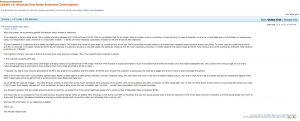
Amazon’s Douglas Preston Problem Isn’t Going Away
/0 Comments/in Books & Writing, Publishing & Bookselling /by Philip Turner
It’ll be interesting to see how Amazon’s board members respond to Authors United’s outreach to them—if at all—particularly the suggestion that while these people may think they joined the board of a progressive company, that’s actually not what Amazon is any more, if they ever were.
#FridayReads, April 4–A Week for Bookselling & Publishing Memoirs: “Amazonia” by James Marcus & “Stet” by Diane Athill
/0 Comments/in Books & Writing, Publishing & Bookselling /by Philip Turner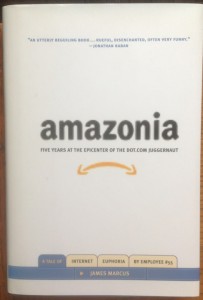 #FridayReads, April 4–AMAZONIA: Five Years at the Epicenter of the Dot.com Juggernaut by Employee #55, James Marcus’s witty and winning memoir of working at Amazon from 1996-2001, which he published with The New Press in 2004. Having earlier this year read and written about Brad Stone’s THE EVERYTHING STORE: Jeff Bezos and the Age of Amazon, which briefly cited Marcus’s book, I also read Marcus’s review of it in Harper’s. I made a point to also read George Packer’s February 2014 New Yorker articles on Amazon, “Cheap Words” and “Amazon and the Perils of Non-Disclosure.” In the latter piece, Packer likens Amazon executives, secure in their Seattle redoubt parceling out only the most limited information about the company, to American officials during the Iraq War confined to Baghdad’s Green Zone who only shared information that suggested the war was going great. I found this analogy quite striking, and suggested, that at least from Packer’s perspective, things may not be going so well for the retail “juggernaut.” Seeing that Marcus was a quoted source for Packer, Marcus’s book has been squarely on my radar for a few months, so I’m glad now to have gotten a copy and begun reading it. It’s immediately enjoyable, with Marcus chronicling the decidedly weird and geeky culture of Amazon and his first meeting with Bezos, when the Amazon founder asked him to “explain a complicated process in as simple a manner as possible.” Humor is sprinkled throughout, as when he begins his new editorial job by writing a 45-word spiel on the seafaring novels of Patrick O’Brian.
#FridayReads, April 4–AMAZONIA: Five Years at the Epicenter of the Dot.com Juggernaut by Employee #55, James Marcus’s witty and winning memoir of working at Amazon from 1996-2001, which he published with The New Press in 2004. Having earlier this year read and written about Brad Stone’s THE EVERYTHING STORE: Jeff Bezos and the Age of Amazon, which briefly cited Marcus’s book, I also read Marcus’s review of it in Harper’s. I made a point to also read George Packer’s February 2014 New Yorker articles on Amazon, “Cheap Words” and “Amazon and the Perils of Non-Disclosure.” In the latter piece, Packer likens Amazon executives, secure in their Seattle redoubt parceling out only the most limited information about the company, to American officials during the Iraq War confined to Baghdad’s Green Zone who only shared information that suggested the war was going great. I found this analogy quite striking, and suggested, that at least from Packer’s perspective, things may not be going so well for the retail “juggernaut.” Seeing that Marcus was a quoted source for Packer, Marcus’s book has been squarely on my radar for a few months, so I’m glad now to have gotten a copy and begun reading it. It’s immediately enjoyable, with Marcus chronicling the decidedly weird and geeky culture of Amazon and his first meeting with Bezos, when the Amazon founder asked him to “explain a complicated process in as simple a manner as possible.” Humor is sprinkled throughout, as when he begins his new editorial job by writing a 45-word spiel on the seafaring novels of Patrick O’Brian.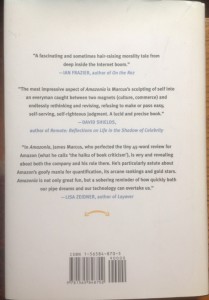
I’m also reading STET: An Editor’s Life, Diane Athill’s London publishing memoir spanning the end of WWII 40s to the 90s with Andre Deutsch Ltd. Athill knew and edited many great writers, including Brian Moore and Mordecai Richler for several of their early books. She recounts having also published Philip Roth’s first novel, LETTING GO, which did well enough that they were going to make an offer on his second book, WHEN SHE WAS GOOD. I love the way she presents this embarrassment:
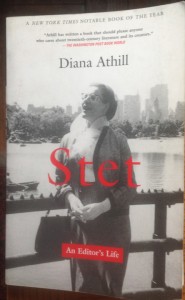 “[We] decided to calculate the advance on precisely what we reckoned the book would sell–which I think was 4,000 copies at the best–and that [offer] was not accepted. As far as I know WHEN SHE WAS GOOD was not a success–but the next novel Philip wrote was PORTNOY’S COMPLAINT.
“[We] decided to calculate the advance on precisely what we reckoned the book would sell–which I think was 4,000 copies at the best–and that [offer] was not accepted. As far as I know WHEN SHE WAS GOOD was not a success–but the next novel Philip wrote was PORTNOY’S COMPLAINT.
This space represents a tactful silence.”
These are illuminating and humorous recollections, gossipy but never malicious, coupled with a wise presentation of editing essentials. She’s also a very endearing narrator. I heard a lot of good things about this publishing memoir when it came out in 2000, and bought it on a trip to a Bay Area publishing sales conference back then. I’m glad I’ve finally made time to read it.
Why Family Members Probably Ought to Refrain from Publicly Defending Relatives
/1 Comment/in Books & Writing, Personal History, Family, Friends, Education, Travels /by Philip TurnerNovember 20 Update: Interesting to see in today’s Deals Report from PublishersMarketplace.com that Sidney Blumenthal is going to publish a new multi-volume biography of Abraham Lincoln with Simon & Schuster. Judging by the report, it looks as if the biographical trilogy is well underway, with the first book due to come out in 2015. Having published two books with Blumenthal in 2008, and found him a very capable author, I’m glad to see he’ll soon be publishing again.
Former assistant and senior adviser to President Bill Clinton and political journalist for publications including the Washington Post, the New Republic, Vanity Fair, and the New Yorker Sidney Blumenthal’s A SELF-MADE MAN, A HOUSE DIVIDED, and JUDGMENTS OF THE LORD, a three-volume biography of Abraham Lincoln exploring new sources coupled with original interpretations that promise to give readers new insights into Lincoln, his genius, and his world, to Alice Mayhew at Simon & Schuster, for publication beginning in 2015, by Robert Barnett at Williams & Connolly.
1/2 @RosieGray reports on intra-religious dustup bet Sidney Blumenthal&Eric_Alterman-he wrote in @TheNation abt book by SB’s son. @Buzzfeed
— Philip Turner (@philipsturner) November 6, 2013
2/2 Alterman-sometimes critical of Israel himself-found Max Blumenthal’s hits out of bounds&Sidney’s objecting widely http://t.co/P75pMifEnm — Philip Turner (@philipsturner) November 6, 2013
Do you think anyone advised Mackenzie Bezos it might backfire to draw attention to @BradStone‘s book&look #Graceless http://t.co/XehzTANsVS — Philip Turner (@philipsturner) November 5, 2013
Yesterday, a Buzzfeed story by Rosie Gray about writer and pundit Sidney Blumenthal* coming to the defense of his author son Max, whose current book Goliath: Life and Loathing in Greater Israel had received a critical review in The Nation from Eric Alterman, left me considering the frequency with which family members step in to attack detractors when they see a spouse, child, or sibling being criticized. This week alone, Doug Ford has been agitating on behalf of his brother, Toronto mayor, Rob Ford, demanding that Police Chief Bill Blair resign his office (merely for stating he was “disappointed” upon viewing tape of the mayor smoking from a crack pipe). A day earlier, it was Mackenzie Bezos, wife of Amazon founder and CEO Jeff Bezos, and a published novelist, giving a poor review to Brad Stone’s new book, The Everything Store: Jeff Bezos and the Age of Amazon, actually posting her knock on the book’s Amazon page. Talk about meta!
I have to question the judgment and wisdom of these three. While the impulse to defend a loved one is understandable, indulging in it is far from the wisest step they could take on behalf of their kin. Even if the comments are well-reasoned and not ad hominem–a contrast seen between the comparatively measured words of Ms. Bezos and the blustery rhetoric of Doug Ford–why do these defenders of the clan fail to see that their comments will be believed by many people to be little more than self-interested attacks on their relatives’ critics? It almost doesn’t matter how they put it–with many people they simply begin as an impeached source. Blumenthal’s critiques of Alterman’s review haven’t been made public, as Gray’s story reports he sent his pushback in emails only to a selected list of contacts, not on the Web or out loud in sullen tones to a national broadcaster.** But whether the words are cool or overheated, not only are these familial defenses often not believed, they also make the relative appear weak and unwilling or unable to fight his/her own battles. What’s more, in hitting the “publish” button on her “review” did Ms. Bezos not consider that she’d be lending Stone and his publisher a welcome jolt of publicity and attention in prominent media around the world? Maybe to Ms. Bezos an attempt to correct the record is more important, but I say she committed a strategic mistake.
After reading yesterday’s story about Blumenthal and Alterman, this morning I read a post on the Guardian book blog, “Is MacKenzie Bezos’s one-star Amazon review part of a trend?“, with even more examples of ill-considered missions on behalf of spouses, including the 2011 example of Ayelet Waldman attacking critics of her husband Michael Chabon’s first childrens book. She denounced “jackasses” and “fucking Amazon reviewers giving Awesome Man 1 star… IT WAS WRITTEN FOR LITTLE KIDS”. Hmm, talk about intemperate.
One of the reasons I’m surprised at the inability of these people to not enter the fray is that in connection with my own wife and teenage son, operating in social media, we typically check with one another before “liking” something by the other, or “tagging” them. We recognize that in one’s social and professional life one doesn’t always want to be shadowed by family members. This prompts the question whether Max Blumenthal, Rob Ford, and Jeff Bezos each gave their blessing to the attacks by their father, brother, and wife, respectively. For my part, if it were me I would say to my loved one, “Please, keep out of it.”
*Disclosure-In 2008 I published two books with Sidney Blumenthal and around that time had dinner with him and his son, Max, journalist Joe Conason, and a handful of other people. I found Max to have a noticeably angry disposition.
** Consider though that this may make a writer more apt to use invective, if he thinks his venting will never be published.
Chabon’s Hyperbole Undermines his Fair Critique
/1 Comment/in Books & Writing, Media, Blogging, Internet, Philip Turner's Books & Writing, Publishing & Bookselling, Technology, Science & Computers /by Philip TurnerI suggest that the book industry view the cost savings from the diminishment of print as a kind of “peace dividend” for authors and publishers and other stakeholders like retail booksellers. Parties should share fairly in whatever windfall is to come. I would accuse the major publishers of being shortsighted and dumb and in thrall to old ways, but I fear that hyperbole like Chabon’s will only further degrade the debate and discussion that must proceed between publishers and authors, lest Amazon eventually become the monopoly publisher and bookseller many bookpeople nowadays fear is looming in our collective future. //more
